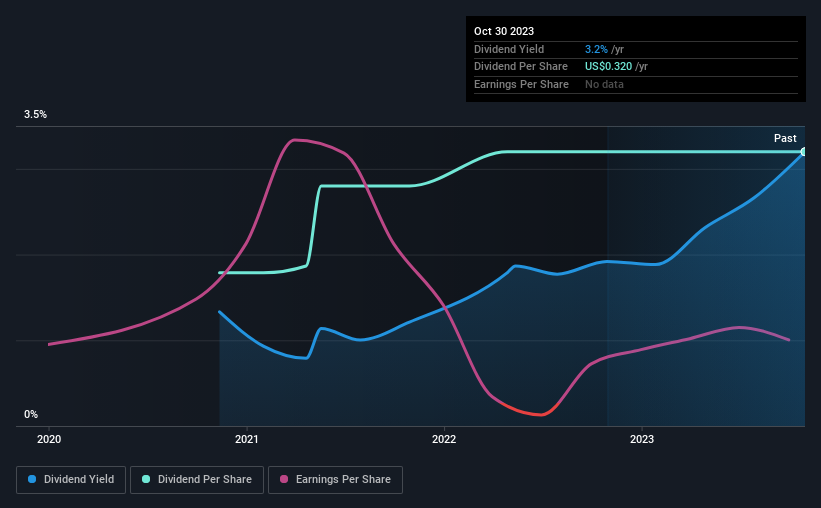BayFirst Financial Corp. (NASDAQ:BAFN) has announced that it will pay a dividend of $0.08 per share on the 15th of December. This payment means the dividend yield will be 3.2%, which is below the average for the industry.
While the dividend yield is important for income investors, it is also important to consider any large share price moves, as this will generally outweigh any gains from distributions. BayFirst Financial's stock price has reduced by 30% in the last 3 months, which is not ideal for investors and can explain a sharp increase in the dividend yield.
Check out our latest analysis for BayFirst Financial
BayFirst Financial's Payment Expected To Have Solid Earnings Coverage
Even a low dividend yield can be attractive if it is sustained for years on end.
BayFirst Financial is just starting to establish itself as being able to pay dividends to shareholders, given its short 3-year history of distributing earnings. While it has a shorter history of paying out dividends, BayFirst Financial's payout ratio of 5.9% is a great sign for current shareholders, as this means that earnings greatly cover dividends.
Over the next year, EPS could expand by 1.2% if recent trends continue. If the dividend continues along recent trends, we estimate the future payout ratio will be 25%, which is in the range that makes us comfortable with the sustainability of the dividend.

BayFirst Financial Doesn't Have A Long Payment History
Looking back, the dividend has been stable, but the company hasn't been paying a dividend for very long so we can't be confident that the dividend will remain stable through all economic environments. Since 2020, the annual payment back then was $0.179, compared to the most recent full-year payment of $0.32. This implies that the company grew its distributions at a yearly rate of about 21% over that duration. BayFirst Financial has been growing its dividend quite rapidly, which is exciting. However, the short payment history makes us question whether this performance will persist across a full market cycle.
Dividend Growth May Be Hard To Achieve
Investors could be attracted to the stock based on the quality of its payment history. However, BayFirst Financial's EPS was effectively flat over the past five years, which could stop the company from paying more every year. While growth may be thin on the ground, BayFirst Financial could always pay out a higher proportion of earnings to increase shareholder returns.
Our Thoughts On BayFirst Financial's Dividend
Overall, we think BayFirst Financial is a solid choice as a dividend stock, even though the dividend wasn't raised this year. While the payout ratios are a good sign, we are less enthusiastic about the company's dividend record. The dividend looks okay, but there have been some issues in the past, so we would be a little bit cautious.
Market movements attest to how highly valued a consistent dividend policy is compared to one which is more unpredictable. Still, investors need to consider a host of other factors, apart from dividend payments, when analysing a company. Case in point: We've spotted 3 warning signs for BayFirst Financial (of which 1 doesn't sit too well with us!) you should know about. Looking for more high-yielding dividend ideas? Try our collection of strong dividend payers.
Valuation is complex, but we're here to simplify it.
Discover if BayFirst Financial might be undervalued or overvalued with our detailed analysis, featuring fair value estimates, potential risks, dividends, insider trades, and its financial condition.
Access Free AnalysisHave feedback on this article? Concerned about the content? Get in touch with us directly. Alternatively, email editorial-team (at) simplywallst.com.
This article by Simply Wall St is general in nature. We provide commentary based on historical data and analyst forecasts only using an unbiased methodology and our articles are not intended to be financial advice. It does not constitute a recommendation to buy or sell any stock, and does not take account of your objectives, or your financial situation. We aim to bring you long-term focused analysis driven by fundamental data. Note that our analysis may not factor in the latest price-sensitive company announcements or qualitative material. Simply Wall St has no position in any stocks mentioned.
About NasdaqCM:BAFN
BayFirst Financial
Operates as the bank holding company for BayFirst National Bank that provides community banking services for small and medium sized businesses and individuals.
Flawless balance sheet and fair value.
Market Insights
Community Narratives


